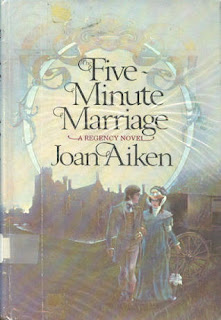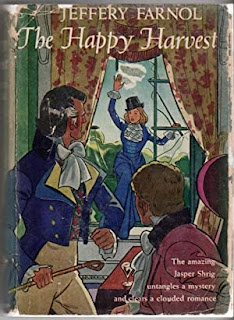Potential Hugo nominees from 1952 (1953 Worldcon)
Continuing my project of suggesting potential Hugo nominees (and winners) for the early years of the Hugos. Here's a look at 1952. This is the year covered by the very first Hugos, from the 11th Worldcon, Philcon II, in Philadelphia, in September 1953. The only Fiction Hugo actually awarded went to Alfred Bester's novel The Demolished Man. Apparently there were plans to name a Short Fiction winner, but there were insufficient votes. The Best Magazine award was a tie between Astounding and Galaxy (that, plus the fact that The Demolished Man appeared in Galaxy, apparently enraged a segment of fans who preferred Astounding.) Best Cover Artist was also a tie, between Hannes Bok and Ed Emshwiller, and Best Interior Artist went to Virgil Finlay. All three of those artist awards make me happy, especially the one to Finlay, my favorite interior illustrator of all time. Philip José Farmer was named Best New Discovery (Writer or Artist), and Forrest J. Ackerman Favorite Fan Personality, while Willy Ley (another Galaxy contributor) won for Best Fact Articles.
Philcon II provided a brief look at the state of the voting in their Progress Report IV, published a month or two ahead of the convention, I believe. Noting that these were early returns, only representing a subset of the members' votes, there are some fascinating details to glean. The second place novel in the voting at that time was The Long Loud Silence, by Wilson Tucker. Second place for Favorite Fan Personality was Harlan Ellison (!). Robert Madle was competing for Best Fact Articles, and Robert Sheckley was vying for Best New Discovery.
Jo Walton's Informal History of the Hugos discusses the novels, and mentions the International Fantasy Award nominees: Clifford D. Simak's City (the winner), Kurt Vonnegut's Player Piano, and C. M. Kornbluth's Takeoff. She also suggested Foundation and Empire as a potential alternative. For myself, I'm disqualifying City and Foundation and Empire because they were published some years previously, in Astounding (in multiple parts of course.) Richard A. Lupoff, in What If, Volume 1, chose William Tenn's "Firewater!" as a potential Short Fiction winner.
I also counted, as best I could (and my count is full of likely errors) the number of short fiction pieces written by women, versus the total number. I came up with 98 stories by women out of some 1100. (I tried to eliminate duplicates, translations from earlier years, and non-genre stories, and I tried to identify pseudonyms, but all these processes are potentially error-ridden.) That comes to about 9%, which is consistent with similar counts by other people using different means for the early 1950s, which generally suggest that about 10% of the SF writers in the early 1950s were women.
Finally, I note humbly that I haven't read everything from this period -- though I have read a lot! I'm including a few things that are so highly praised that I believe they deserve a nod even though I can't personally vouch for them, and I've added stories thanks to intriguing recommendations in the comments here and in other places.
Novels
The Demolished Man, by Alfred Bester
Star Man's Son aka Daybreak 2230 A.D., by Andre Norton
The Space Merchants aka "Gravy Planet", by Frederik Pohl and C. M. Kornbluth
The Sound of His Horn, by "Sarban" (John William Wall)
The Long Loud Silence, by Wilson Tucker
Player Piano, by Kurt Vonnegut
Other possibilities:
The Currents of Space, by Isaac Asimov
Jack of Eagles, by James Blish
Takeoff, by C. M. Kornbluth
Ballroom of the Skies, by John D. MacDonald
Ullr Uprising, by H. Beam Piper
The Blue Star, by Fletcher Pratt
Big Planet, by Jack Vance
Limbo, by Bernard Wolfe
Young Adult:
Vault of the Ages, by Poul Anderson
The Rolling Stones, aka "Space Family Stone", by Robert A. Heinlein
The Voyage of the Dawn Treader, by C. S. Lewis
The Borrowers, by Mary Norton
I think my vote would stay with The Demolished Man, but that is pending reading The Sound of His Horn and The Long Loud Silence, both of which are highly praised by people I trust, and which I haven't yet read. (The Long Loud Silence, at any rate, is on the way!) Certainly "Gravy Planet" would have been a good choice, and so would Player Piano. Star Man's Son is a favorite early Norton of mine and many others.
The mainstream produced one major candidate: Bernard Wolfe's Limbo. (Vonnegut was still being marketed, at least to a degree, as an SF writer.) And that set of what were then called "Juveniles" is interesting. Note that the Heinlein was serialized in Boys' Life. On my latest rereading of the Chronicles of Narnia, The Voyage of the Dawn Treader became my favorite.
Novellas
"Shannach -- the Last", by Leigh Brackett (Planet Stories, November)
"The Specter General", by Theodore Cogswell (Astounding, June)
"The Lovers", by Philip José Farmer (Startling, October)
"Daughters of Earth", by Judith Merrill (The Petrified Planet)
"Baby is Three", by Theodore Sturgeon (Galaxy, October)
"Firewater!", by William Tenn (Astounding, February)
Other possibilities:
"War-Maid of Mars", by Poul Anderson (Planet Stories, May)
"Sargasso of Lost Starships", by Poul Anderson (Planet Stories, January)
"Three Day Magic", by Charlotte Armstrong (F&SF, September 1952)
"Tonight the Sky Will Fall!", by Daniel F. Galouye (Imagination, May)
"Bring the Jubilee", by Ward Moore (F&SF, November 1952)
"Blood's a Rover", by Chad Oliver (Astounding, May)
"Abercrombie Station", by Jack Vance (Thrilling Wonder, February)
"Chulwell's Chickens", by Jack Vance (Thrilling Wonder, August)
I will confess now that I've never warmed to "The Lovers" much, and I include it on the nomination list above for its historical importance, and also to acknowledge that contemporary readers likely would have nominated it as it was something of a sensation. "The Specter General" is in the SF Hall of Fame, Volume II, and it's a fun story, but it's another story I've long thought overrated (especially after a recent reread.) The best story on the list is probably "Baby is Three" (also in the SF Hall of Fame, Volume II), but as an alternate choice for the 1953 Hugo (and noting that "Baby is Three" is also part of the novel More Than Human) I'm tempted to suggest "Daughters of Earth". I think this story -- an account of six generations of women central to the human colonization of extraterrestrial planets -- has been underrated from the very start. In part this may be because it was first published in an anthology that, while somewhat famous, didn't seem to sell well; and was never reprinted until Merril's 1968 collection also called Daughters of Earth. Also, it's fair to say that a significant subplot involving communication with silicon-based aliens stretched my sense of plausibility a bit. But the character stuff, the portrayal of the women, really works.
Actually all the "other possibilities" are personal indulgences, not serious Hugo candidates, except maybe for Chad Oliver's story, or perhaps Charlotte Armstrong's story, which comes recommended by Paul Fraser. Also perhaps Ward Moore's "Bring the Jubilee", a long novella that I mentioned for its slightly longer novel version in my 1953 post. The Anderson stories are early work, and very "pulpy" (though fun), and anyway I couldn't resist mentioning "Sargasso of Lost Spaceships" having listed James Blish's "Sargasso of Lost Cities" among the candidates from 1953. The Vance stories are linked, and were published as a fixup "novel" under the title Monsters in Orbit, an Ace Double half.
Novelettes
"The Year of the Jackpot", by Robert A. Heinlein (Galaxy, March)
"The Martian Way", by Isaac Asimov (Galaxy, December)
"Bridge", by James Blish (Astounding, February)
"Surface Tension", by James Blish (Galaxy, August)
"The Birds", by Daphne Du Maurier (Good Housekeeping, October)
"Ararat", by Zenna Henderson (F&SF, October)
Other possibilities:
"The Deep", by Isaac Asimov (Galaxy, December)
"Youth", by Isaac Asimov (Space Science Fiction, May)
"The Last Days of Shandakor", by Leigh Brackett (Startling, April)
"Star, Bright", by Mark Clifton (Astounding, July)
"Steel Brother", by Gordon R. Dickson (Astounding, February)
"What's It Like Out There?", by Edmond Hamilton (Thrilling Wonder, December)
"That Share of Glory", by C. M. Kornbluth (Astounding, January)
"Lover When You're Near Me", by Richard Matheson (Galaxy, May)
"Noise Level", by Raymond F. Jones (Astounding, December)
"Conditionally Human", by Walter M. Miller, Jr. (Galaxy, February)
"Delay in Transit", by F. L. Wallace (Galaxy, September)
In this category I think I have to choose "Surface Tension" as the winner. But Blish's other candidate, "Bridge", the first story chronologically in Cities in Flight (and thus the first part of They Shall Have Stars) is also excellent. "The Martian Way" is one of my favorite Asimov stories. "Ararat", the first of Zenna Henderson's People stories, is very good as well; and the Heinlein and Du Maurier stories are also excellent. Still, "Surface Tension" remains the best and most significant story of this bunch. (Note that the version in The Seedling Stars is a fixup of the Galaxy novelette and a much earlier story, Blish's first significant story, "Sunken Universe", from the May 1942 issue of Super Science Stories, as by "Arthur Merlyn" (talk about a pseudonym that screams "pseudonym"!) Blish significantly revised it for the novel version.)
From the other possibilities -- a pretty good list in itself -- I'll mention in particular Raymond F. Jones' "Noise Level", a pure quill Campbellian crank story, but one which I found very effective on a recent reread. Indeed, Jones is a writer worth a look, sort of in the Daniel F. Galouye or J. T. MacIntosh realm -- an uneven and sometimes irritating writer who could still be intriguing. And "Conditionally Human" is generally remembered as a novella, but the 1952 Galaxy version was a novelette, expanded for its reprinting in the T. E. Dikty anthology Year's Best Science Fiction Novels: 1953.) I should also add that "What's it Like Out There?" is quite a powerful story about an embittered spaceman returning from Mars -- it may be the best story Hamilton every wrote.
Short Stories
"A Sound of Thunder", by Ray Bradbury (Collier's, June 28)
"Hobson's Choice", by Alfred Bester (F&SF, August)
"What Have I Done?", by Mark Clifton (Astounding, May)
"The Analogues", by Damon Knight (Astounding, January)
"The Snowball Effect", by Katherine MacLean (Galaxy, September)
"An Egg a Month from All Over", by "Idris Seabright" (Margaret St. Clair) (F&SF, October)
Other possibilities:
"Beyond Lies the Wub", by Philip K. Dick (Planet Stories, July)
"Faq'", by George P. Elliott (The Hudson Review, Spring)
"The Foxholes of Mars", by Fritz Leiber (Thrilling Wonder, June)
"The Altar at Midnight", by C. M. Kornbluth (Galaxy, November)
"The Luckiest Man in Denv", by C. M. Kornbluth (Galaxy, June)
"The Fly", by Arthur Porges (F&SF, September)
"I Am Nothing", by Eric Frank Russell (Astounding, July)
Another set of pretty strong stories. I'm torn between "An Egg a Month from All Over", which is clever and mounts to a delightfully nasty ending; and "The Analogues", a brilliant and scary piece that became part of a less effective novel, Hell's Pavement. The George Elliott piece, which has been called Borgesian, is worth a look, from a writer who often touched on the fantastic.





